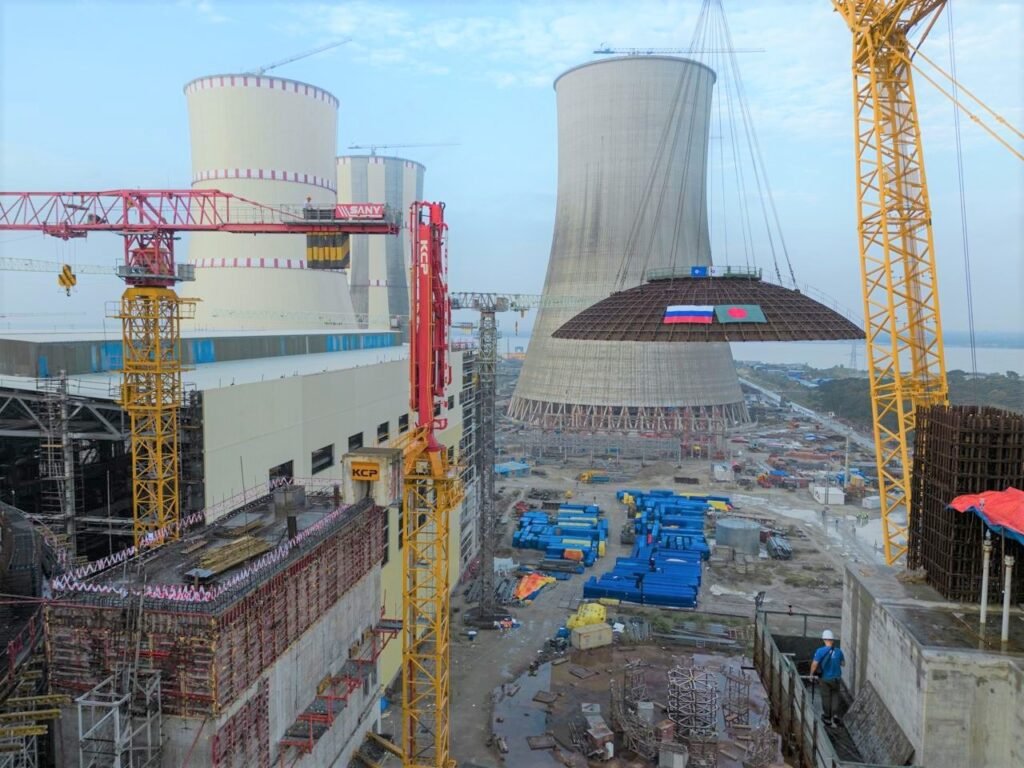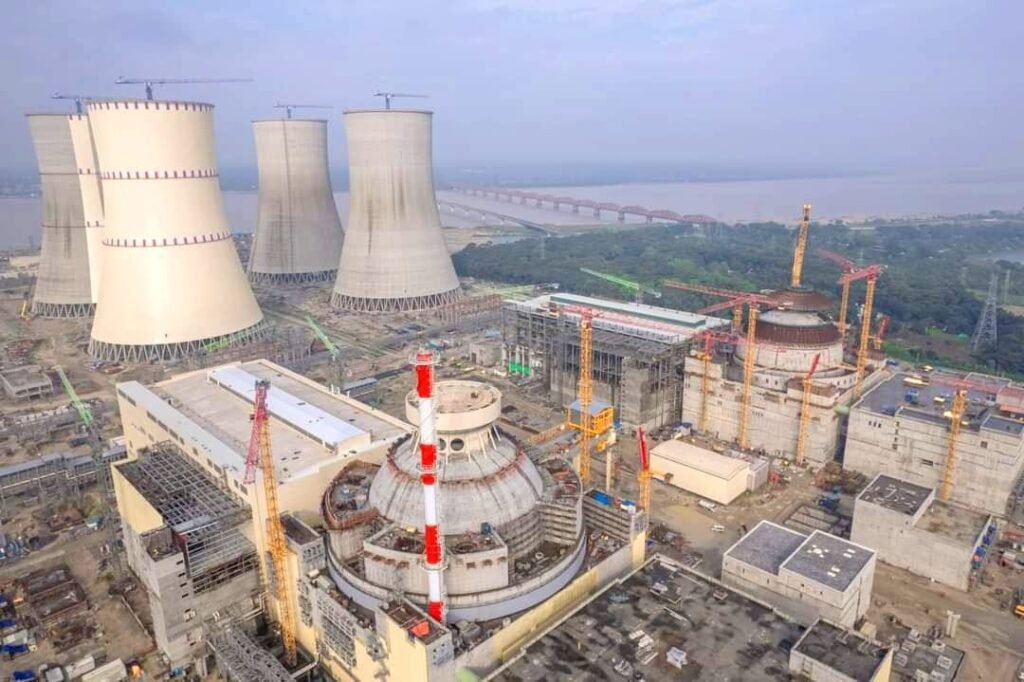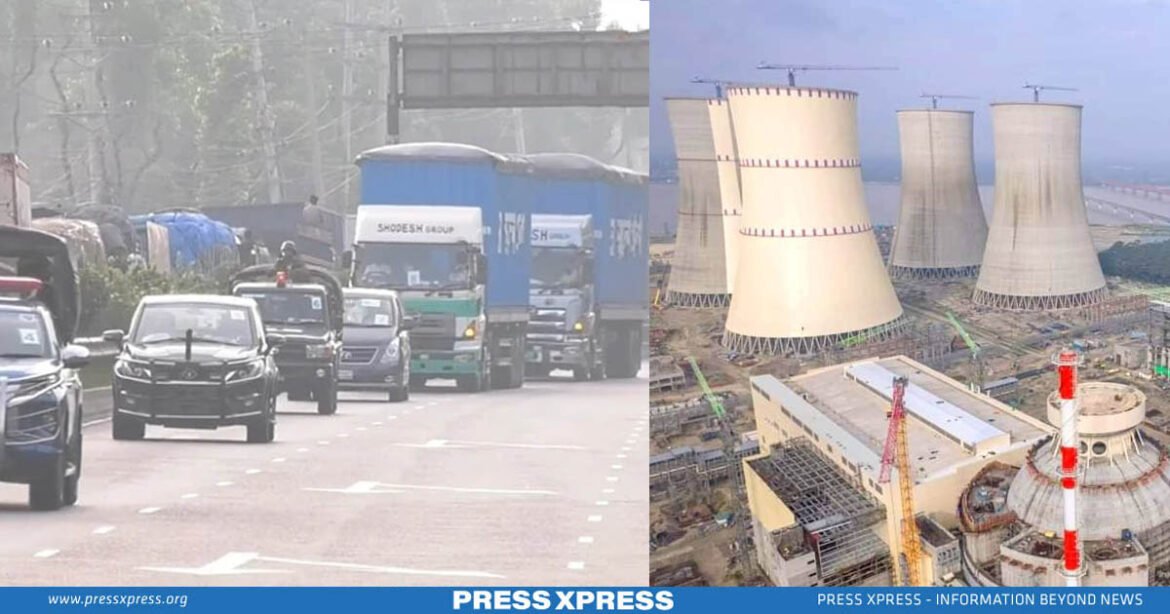The finance ministry provided a guarantee of Tk4,346 crore to cover potential accident-related compensation during nuclear fuel transportation.
The first shipment of nuclear fuel destined for Unit-1 of Bangladesh’s groundbreaking 2,400-megawatt (MW) Rooppur Nuclear Power Plant (RNPP) successfully arrived in Dhaka on September 28th. This significant step marks a historic moment in Bangladesh’s journey towards establishing its nuclear power generation infrastructure.
Official reports indicate that the uranium consignment made its way to Dhaka from Russia on a specially designated air cargo flight on a Thursday afternoon.
You can also read: “Cox’s Bazar District Master Plan Preparation” Contract Signing Ceremony Commenced
M Shawkat Akbar, the project director of the Rooppur Nuclear Power Project, has verified the safe arrival of the nuclear fuel. However, he refrained from disclosing specific details regarding the air transport of the nuclear fuel due to security considerations.
From Russia to Bangladesh
Produced at the Novosibirsk Chemical Concentrates Plant (NCCP) in Russia, a subsidiary of Rosatom’s fuel manufacturing company TVEL, the uranium has reached its destination in Bangladesh. The next leg of this journey involves transporting the precious cargo by road to the RNPP project site in Ishwardi, Pabna. This operation is being conducted under the vigilant protection of the Bangladesh Army and law enforcement officers, ensuring the utmost safety and security during the transport process.
Official Handover

The formal handover of this critical shipment to the Rooppur project authorities is scheduled for October 5th and will be presided over by Rosatom Director General Alexey Likhachev. This momentous event underscores the close collaboration between Bangladesh and Russia in realizing the ambitious Rooppur Nuclear Power Plant project.
A Glimpse into Bangladesh’s Energy Future
Bangladesh is on a transformative path with its first nuclear power generation infrastructure, the Rooppur Nuclear Power Plant, situated in Ishwardi upazila in Pabna. According to the project’s timeline, the first unit of this colossal 2,400MW nuclear power plant is poised to commence commercial operation in the first quarter of 2024.
With an estimated cost of $13 billion, this project is being executed by the Bangladesh Atomic Energy Commission, with Russia providing technical and financial support.
However, before the nuclear fuel can be loaded into the reactor, stringent safety measures and essential infrastructure components, including power transmission lines and telecommunication, must be certified by the International Atomic Energy Agency’s (IAEA) visiting team. These precautions are vital to ensure the plant’s safe and efficient operation.
Sustainable Future
The Bangladesh Atomic Energy Commission (BAEC) took a significant step towards securing a reliable supply of nuclear fuel for the plant when it signed a contract with Russia’s state-run uranium mining and nuclear fuel production company TVEL in August 2019. To maintain the plant’s efficiency, approximately one-third of the nuclear fuel in the reactor will need to be replaced every 18 months, emphasizing the importance of a steady supply.
This momentous arrival of the first batch of fresh uranium for the Rooppur Nuclear Power Plant signifies a landmark achievement in Bangladesh’s quest for energy independence and sustainability. As the nation takes its place among nuclear energy-producing countries, it is poised to contribute significantly to its energy needs while reducing reliance on fossil fuels and paving the way for a cleaner, greener future.

The successful transport and installation of this nuclear fuel underscore the commitment of Bangladesh to responsible and secure nuclear energy utilization. With this significant milestone, Bangladesh is forging ahead into a brighter and more sustainable energy landscape, promising a better future for its citizens and the environment.
Bangladesh to serve on IAEA Board of Governors
Bangladesh has received another positive news as it has been elected to serve on the Board of Governors for the International Atomic Energy Agency (IAEA). This selection comes as part of the recent election where eleven countries have been newly chosen to serve on the 35-member IAEA Board of Governors for the 2023–2024 term. The election event took place on Thursday, 28 September, during the plenary session of the 67th IAEA General Conference.
In total, eleven new countries, including Bangladesh, will serve on the 35-member IAEA Board of Governors. Here are the other newly elected countries: Algeria, Armenia, Burkina Faso, Ecuador, Indonesia, Republic of Korea, Netherlands, Paraguay, Spain, and Ukraine.
For the 2023–2024 period, the updated composition of the 35-member IAEA Board will be as follows: Algeria, Argentina, Armenia, Australia, Bangladesh, Brazil, Bulgaria, Burkina Faso, Canada, China, Costa Rica, Denmark, Ecuador, Finland, France, Germany, India, Indonesia, Japan, Kenya, Republic of Korea, Namibia, Netherlands, Paraguay, Qatar, Russian Federation, Saudi Arabia, Singapore, South Africa, Spain, Türkiye, United Kingdom of Great Britain and Northern Ireland, United States of America, Uruguay, and Ukraine.
The Board of Governors serves as one of the two governing bodies responsible for policy decisions within the IAEA, alongside the annual General Conference of IAEA Member States.


